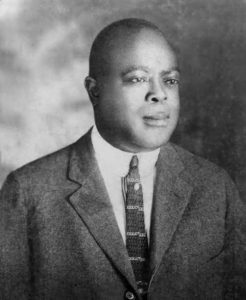King Oliver
King Oliver’s Creole Jazz Band has been reported as a “live sensation” and one of the first Black New Orleans jazz ensembles to gain recognition in the recording industry1. For these reasons, the band is widely regarded by historians as one of the most influential jazz bands of all time. Though King Oliver’s Creole Jazz Band subsequently went down in history, the band could never have existed without The Original Creole Jazz Band (founded by bassist Bill Johnson) and Lawrence Duhés’ New Orleans Jazz Band2. Similarly, the band could never have existed without their bandleader, King Oliver. Born in 1881 in Aben, Louisiana, Joseph “King” Oliver worked tirelessly on reading music and becoming the gifted musician that he is known for now. At the age of 19, Oliver played the cornet and found himself touring with the Onward Brass Band at the turn of the twentieth century3. Oliver also regularly worked in various marching and cabaret bands in the New Orleans area. Over the course of Oliver’s career, his unique style and musical innovations manifested through his use of trumpet mutes and effects. Today, the Harmon Company manufactures the Harmon mute which was inspired by Oliver and his “wa-wa” sound. Oliver made this technique particularly famous by using it in three choruses on the “Dippermouth Blues,” a recording from his Creole Jazz Band’s first recording session at Gennette Records in Richmond, Indiana4.
After a brief residency in California, Oliver finally settled in Chicago, Illinois in 1918 and began forming an ensemble of his own. The ensemble, recognized today from their thirty-seven recordings, consisted of cornetist King Oliver, second cornetist Louis Armstrong, bassist Bill Johnson, trombonist Honore Dutrey, clarinetist Johnny Dodds, drummer Warren “Baby” Dodds, and pianist Lillian Hardin5. King Oliver’s Creole Jazz Band debuted on June 17, 1922 at the Lincoln Gardens Café in Chicago6. Following the debut, the band steadily gained notoriety and recognition from locals, however more firepower was needed. Shortly after the band’s debut, Oliver wired New Orleans requesting a second cornetist— Oliver’s former apprentice, Louis Armstrong. In 1923, the band made history by recording 9 sides in Richmond, Indiana at Gennett Records7.
As King Oliver’s Creole Jazz Band grew in popularity, so did the popularity of Louis Armstrong. Armstrong’s talents were so unmatched that it was almost inevitable that he would leave the band and begin his own career. After the departure of Armstrong, the band started to face major obstacles, including financial problems, which led to the group disbanding in 1924. In 1935, Oliver stopped playing the cornet as he suffered from a gum disease causing a rapid decline in his performing abilities. Eventually, King Oliver settled in Savannah, Georgia, where he maintained a small fruit stand, and tragically died from a heart attack in 1938. His former band mate, Louis Armstrong, later suggested Oliver’s death was in fact due to a broken heart from not being able to play cornet anymore8.
1 Anderson, Gene H. “The Genesis of King Oliver’s Creole Jazz Band.” American Music 12, no. 3, 1994, pp. 283-303, https://scholarship.richmond.edu/cgi/viewcontent.cgi?article=1006&context=music-faculty-publications
2 Anderson, Gene H. “The Genesis of King Oliver’s Creole Jazz Band.” American Music 12, no. 3, 1994, pp. 283-303, https://scholarship.richmond.edu/cgi/viewcontent.cgi?article=1006&context=music-faculty-publications
3 Doyle, Dave, et al. “Joe ‘King’ Oliver (1885-1938).” The Syncopated Times, 19 Dec. 2020, https://syncopatedtimes.com/joe-king-oliver-1885-1938/.
4 Walton, Peter. “Joseph ‘King’ Oliver (1885-1938) .” Black Past, 20 May 2021, https://www.blackpast.org/african-american-history/oliver-joseph-king-1885-1938/.
5 Anderson, Gene H. “The Genesis of King Oliver’s Creole Jazz Band.” American Muisc 12, no. 3, 1994, pp. 283-303, https://scholarship.richmond.edu/cgi/viewcontent.cgi?article=1006&context=music-faculty-publications
6 Anderson, Gene H. “The Genesis of King Oliver’s Creole Jazz Band.” American Music 12, no. 3, 1994, pp. 283-303, https://scholarship.richmond.edu/cgi/viewcontent.cgi?article=1006&context=music-faculty-publications

You must be logged in to post a comment.